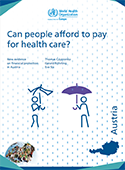Can people afford to pay for health care? New evidence on financial protection in Austria (2018)

Download
xi + 79 pages
ISBN 978 92 8905 339 6
This publication is only available online.
This review is part of a series of country-based studies generating new evidence on financial protection in European health systems. Financial protection is central to universal health coverage and a core dimension of health system performance.
The incidence of catastrophic health spending is lower in Austria than in many countries in Europe, but higher than in countries such as France, Slovenia, Sweden and the United Kingdom. The main gap in health coverage comes from user charges (co-payments), which are applied to most health services and can be high for some groups of people.
Importantly, the type and level of co-payment often vary significantly across social insurance schemes and funds, exacerbating inequality in access to health care. Co-payments for outpatient medicines, however, are uniform across the country, and made more affordable by an income-related cap set at 2% of household income.
To improve financial protection in Austria, policy attention should focus on ensuring that low-income households are systematically exempt from all co-payments, and on extending the income-related cap to co-payments for all health services. Some of this could be financed by better use of public resources and redistribution across social insurance schemes through a risk-equalization mechanism.



